Oreos and You
- Email This
- Share Link
The Chicago Tribune reported on the addictive effects of snacks as part of a series on current causes of obesity.
According to the article, "Moments after a person eats an Oreo or any other sweet, the brain's pleasure centers release opiatelike compounds--chemical cousins of morphine. The result bears similarities to addiction, though many researchers say it is more like turning on a built-in craving." (THE OREO, OBESITY AND US: PART 1 OF 3, Craving the cookie, by Jeremy Manier, Patricia Callahan and Delroy Alexander, August 21, 2005).
We've always understood that there is a connection between food and addiction, but the article sheds new light on the way companies have capitalized on addictive tendencies to market food products. Sure, Oreos like many other snacks are tasty, but they also have long-term consequences.
The article continues: "In a brain-scan study last year, scientists found that the thought and sight of ice cream set off the same neurological pleasure centers in healthy subjects as the images of crack pipes did for drug addicts."
Companies defend by pointing out that consumers have to take responsibility for their choices. This is a kind of "assumption of risk" argument that physicians have made in malpractice cases involving complementary and integrative medical therapies. The truth probably lies in between -- there is individual responsibility for choices that create obesity, and the culture itself is preying on human weaknesses, thus perpetuating and enlarging existing social dilemmas. Fears of liability, however, prevent corporate spokespersons from overly admitting culpability.
The studies though don't lie: they show the correlation between nutritional extravagance and addiction.
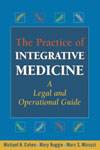 The Practice of Integrative Medicine: A Legal and Operational Guide is now available from Springer.
The Practice of Integrative Medicine: A Legal and Operational Guide is now available from Springer.
 One of the transformations facing health care in the twenty-first century is the safe, effective, and appropriate integration of
One of the transformations facing health care in the twenty-first century is the safe, effective, and appropriate integration of
 Michael H. Cohen's novel A Question of Time is about consciousness. Gabriel Goodman takes a vacation from his law firm
Michael H. Cohen's novel A Question of Time is about consciousness. Gabriel Goodman takes a vacation from his law firm
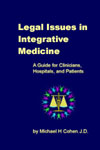 Legal Issues in Integrative Medicine: A Guide for Clinicians, Hosptials, and Patients by Michael H. Cohen (National Acupuncture Foundation,
Legal Issues in Integrative Medicine: A Guide for Clinicians, Hosptials, and Patients by Michael H. Cohen (National Acupuncture Foundation,
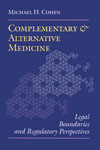 In Complementary and Alternative Medicine: Legal Boundaries and Regulatory Perspectives, Michael H. Cohen breaks new ground in putting together the
In Complementary and Alternative Medicine: Legal Boundaries and Regulatory Perspectives, Michael H. Cohen breaks new ground in putting together the
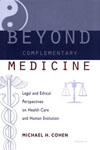 In Beyond Complementary Medicine, Michael H. Cohen goes deeper into the legal, ethical, and regulatory aspects of integrating complementary and
In Beyond Complementary Medicine, Michael H. Cohen goes deeper into the legal, ethical, and regulatory aspects of integrating complementary and
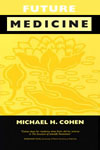 Future Medicine by Michael H. Cohen is an investigation into the clinical, legal, ethical, and regulatory changes occurring in our
Future Medicine by Michael H. Cohen is an investigation into the clinical, legal, ethical, and regulatory changes occurring in our
 What happens when a Wall Street lawyer, steeped in Judaism, enters an interfaith seminary, engages mystically, and connects with disincarnate
What happens when a Wall Street lawyer, steeped in Judaism, enters an interfaith seminary, engages mystically, and connects with disincarnate